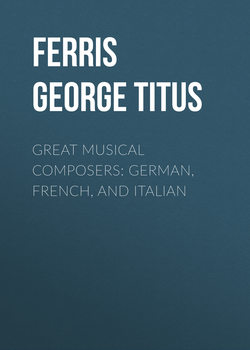Читать книгу Great Musical Composers: German, French, and Italian - Ferris George Titus - Страница 12
GLUCK
I
ОглавлениеGluck is a noble and striking figure in musical history, alike in the services he rendered to his art and the dignity and strength of his personal character. As the predecessor of Wagner and Meyerbeer, who among the composers of this century have given opera its largest and noblest expression, he anticipated their important reforms, and in his musical creations we see all that is best in what is called the new school.
The man, the Ritter Christoph Wilibald von Gluck, is almost as interesting to us as the musician. He moved in the society of princes with a calm and haughty dignity, their conscious peer, and never prostituted his art to gain personal advancement or to curry favour with the great ones of the earth. He possessed a majesty of nature which was the combined effect of personal pride, a certain lofty self-reliance, and a deep conviction that he was the apostle of an important musical mission.
Gluck’s whole life was illumined by an indomitable sense of his own strength, and lifted by it into an atmosphere high above that of his rivals, whom the world has now almost forgotten, except as they were immortalised by being his enemies. Like Milton and Bacon, who put on record their knowledge that they had written for all time, Gluck had a magnificent consciousness of himself. “I have written,” he says, “the music of my ‘Armida’ in such a manner as to prevent its soon growing old.” This is a sublime vanity inseparable from the great aggressive geniuses of the world, the wind of the speed which measures their force of impact.
Duplessis’s portrait of Gluck almost takes the man out of paint to put him in flesh and blood. He looks down with wide-open eyes, swelling nostrils, firm mouth, and massive chin. The noble brow, dome-like and expanded, relieves the massiveness of his face; and the whole countenance and figure express the repose of a powerful and passionate nature schooled into balance and symmetry: altogether the presentment of a great man, who felt that he could move the world and had found the pou sto. Of a large and robust type of physical beauty, Nature seems to have endowed him on every hand with splendid gifts. Such a man as this could say with calm simplicity to Marie Antoinette, who inquired one night about his new opera of “Armida,” then nearly finished – “Madame, il est bientôt fini, et vraiment ce sera superbe.”
One night Handel listened to a new opera from a young and unknown composer, the “Caduta de’ Giganti,” one of Gluck’s very earliest works, written when he was yet corrupted with all the vices of the Italian method. “Mein Gott! he is an idiot,” said Handel; “he knows no more of counterpoint then mein cook.” Handel did not see with prophetic eyes. He never met Gluck afterwards, and we do not know his later opinion of the composer of “Orpheus and Eurydice” and “Iphigenia in Tauris.” But Gluck had ever the profoundest admiration for the author of the “Messiah.” There was something in these two strikingly similar, as their music was alike characterised by massive simplicity and strength, not rough-hewn, but shaped into austere beauty.
Before we relate the great episode of our composer’s life, let us take a backward glance at his youth. He was the son of a forester in the service of Prince Lobkowitz, born at Weidenwang in the Upper Palatinate, 2nd July 1714. Gluck was devoted to music from early childhood, but received, in connection with the musical art, an excellent education at the Jesuit College of Kommotau. Here he learned singing, the organ, the violin and harpsichord, and had a mind to get his living by devoting his musical talents to the Church. The Prague public recognised in him a musician of fair talent, but he found but little encouragement to stay at the Bohemian capital. So he decided to finish his musical education at Vienna, where more distinguished masters could be had. Prince Lobkowitz, who remembered his gamekeeper’s son, introduced the young man to the Italian Prince Melzi, who induced him to accompany him to Milan. As the pupil of the Italian organist and composer, Sammartini, he made rapid progress in operatic composition. He was successful in pleasing Italian audiences, and in four years produced eight operas, for which the world has forgiven him in forgetting them. Then Gluck must go to London to see what impression he could make on English critics; for London then, as now, was one of the great musical centres, where every successful composer or singer must get his brevet.
Gluck’s failure to please in London was, perhaps, an important epoch in his career. With a mind singularly sensitive to new impressions, and already struggling with fresh ideas in the laws of operatic composition, Handel’s great music must have had a powerful effect in stimulating his unconscious progress. His last production in England, “Pyramus and Thisbe,” was a pasticcio opera, in which he embodied the best bits out of his previous works. The experiment was a glaring failure, as it ought to have been; for it illustrated the Italian method, which was designed for mere vocal display, carried to its logical absurdity.
